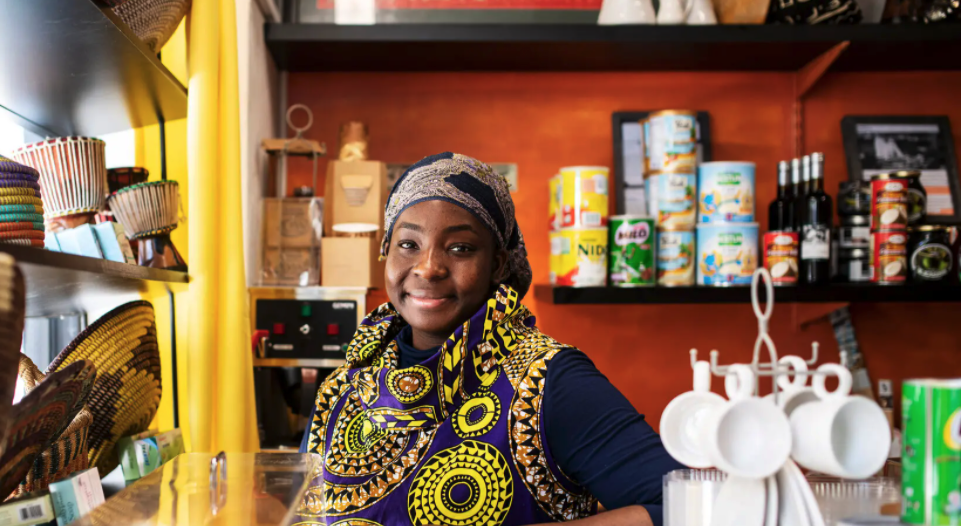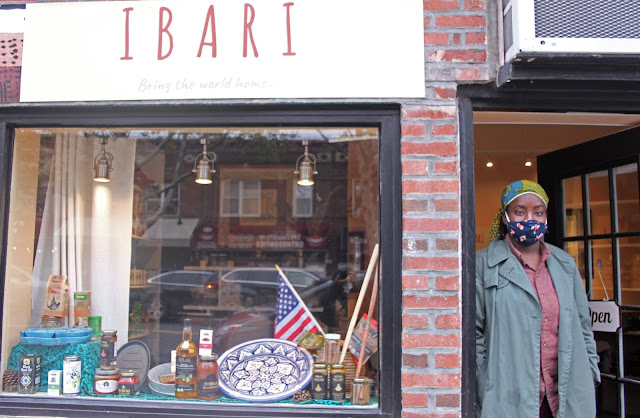
Photo of Beatrice Ajaero, Esq. by New York Times
Repost from the excellent CulinaryBackstreets.com blog.
GUEST BLOG / By Dave Cook, Culinary Backstreets correspondent, Queens, NY.--“We’ve tried our best to return to deeper ways of cooking,” says Beatrice Ajaero, sitting in the front room of Nneji (nn-Nay-jee).
The name of her grocery and takeaway restaurant – which opened in Astoria during the early summer of 2020, not long after the coronavirus pandemic crested in New York City – has been translated, simply, as “mother.” That’s too pat a translation from the Igbo language of southern Nigeria, Beatrice explains.
“May I never be disconnected from my maternal heritage” gives a fuller sense of the meaning. More prosaically, “nneji” expresses the desire that “may I never forget where I come from.”
On the signage outside the shop, three words echo that spirit: “Bring the World Home.” Beatrice, 29, the third of six siblings, was raised on Roosevelt Island, a sliver in the East River between Manhattan (of which it’s a part) and Queens.
Her mother’s family has roots in New Jersey, a neighboring state that, like New York, is home to many Nigerian Americans, and her mother’s memories of “how her aunties cooked” are re-enacted in the family kitchen to this day. “My mom still guides the menu” at Nneji, Beatrice adds.
From the age of 12, when she was the youngest student in a cake-decorating class, Beatrice had wanted to be a food entrepreneur. Rather than pursue culinary school, however, she went off to Bard College, about 100 miles up the Hudson River, then to the University of Buffalo School of Law, near the Canadian border, where she lived with her godparents.
Her godfather served as a cook in the National Guard for many years, and Beatrice took to heart his work ethic, which tempered culinary talent with diligence. During this time she traveled to Africa, where she had the opportunity to study food traditions firsthand.
Notably, in the summer before her third year of law school, Beatrice ran bakeries and restaurants in the Gambia, where she took up the challenge of minimizing imported supplies by sourcing domestically. Eventually, with both a B.A. and J.D. in hand, she returned to Bard for its M.B.A. in Sustainability program.
Both Beatrice and her mother have wanted to share West African culinary culture with their friends and neighbors for many years. But only in 2018, after completing her formal studies, did Beatrice launch Ibari, a food and gift stall, in the Saturday farmers’ market on Roosevelt Island.
On a recent visit, the stall was given over to an eclectic collection of foodstuffs, some imported, some made locally, representing traditions from West Africa, North Africa and across the Mediterranean: Ghanaian palm oil, Moroccan harissa, Sicilian ciabatta, Greek kefalofaviera, Balkan ajvar, Middle Eastern hummus and babaganoush. (Most of the gifts, including musical instruments, kitchenware, fabric and more, now reside at an Ibari storefront in Astoria.)
Both Beatrice and her mother have wanted to share West African culinary culture with their friends and neighbors for many years. Oils, sauces and many other foods “cut across cultures,” Beatrice observes, providing the opportunity for “sharing heritage through food traditions.” And for sharing feedback on Nneji menu items, too, when Beatrice tries them out at the farmers’ market: “Because they’re our neighbors,” she notes, customers at the market are very straightforward with their opinions.
Two of Beatrice’s siblings, a younger brother and sister who were attending Lutheran school in Astoria, eventually “brought me to the neighborhood,” she says. Nneji opened its doors in June. It brought the rare and tempting prospect of Nigerian food in western Queens.
Elsewhere in the borough, the only other such businesses open to the general public are found far to the southeast, down by JFK Airport. An early visit offered egusi (squash-seed sauce with spinach, tomato, chile pepper and palm oil) paired with garri (fermented, slightly sour cassava).
 |
| "Egusi, a red stew with okra" |
The first is scooped up with a pinch of the second, using the fingers of the right hand (more traditional, and more effective, than the plastic fork also provided). Beatrice notes that “we add an Igbo touch” even to non-Igbo dishes such as efo riro, a stew prepared with leafy greens, from the Yoruba cuisine of southwestern Nigeria, and edikaikong, another greens-based stew, from Calabar, near the border with Cameroon. Cow skin, cow foot, bacalao and Norwegian cod are added to the stock for both these dishes, and to other dishes including the egusi, a so-called “red stew,” and okra. (Note: At Nneji, as at many West African restaurants in New York, not every menu item is prepared every day.)
Ingredients such as cow skin, Beatrice observes, were used for culinary purposes by many members of her grandparents’ generation, in many cultures. Not only is it a connection to her heritage, it’s a “point of respect” that Nneji helps to minimize waste by using a part of the animal that otherwise might be discarded. For similar reasons, when sourcing produce Nneji relies on local suppliers as often as possible.
The “deeper ways of cooking” in which Beatrice takes pride involve Nneji’s use of seeds and beans to build its own spice blend, rather than relying on bouillon cubes – a labor-intensive practice that today is not so common in Nigerian homes. Although she did not specify ingredients (and we did not press), Beatrice says that the house blend “gives cohesion” to dishes, so they have a familial connection with one another.
The smokier notes resonate even in dishes that contain no cod or bacalao; the spicier notes “[do] for us what salt does” for some other cuisines. The blend also offers antioxidant and anti-inflammatory benefits, Beatrice says. Near the front door of Nneji sits a small display case of pastries from the local Sicilian bakery Rose and Joe’s, whose bread also appears on Roosevelt Island. Beyond, in the same spirit as at the farmers’ market, a collection of colorful foodstuffs prompts “very vibrant conversations around sourcing and ingredients,” Beatrice says.
“For me, it’s the happiest thing to do.”

Photo by Dave Cook, CulinaryBackstreets.com
Also, you can find Ibari at the Roosevelt Island Farmers’ Market, 543 Main St., on Saturdays from 9am-3pm. The Ibari storefront (pictured above) is located at 2616 23rd Ave., Astoria, and is open on weekday evenings – call +1 (917) 832-7338 for exact hours.

No comments:
Post a Comment